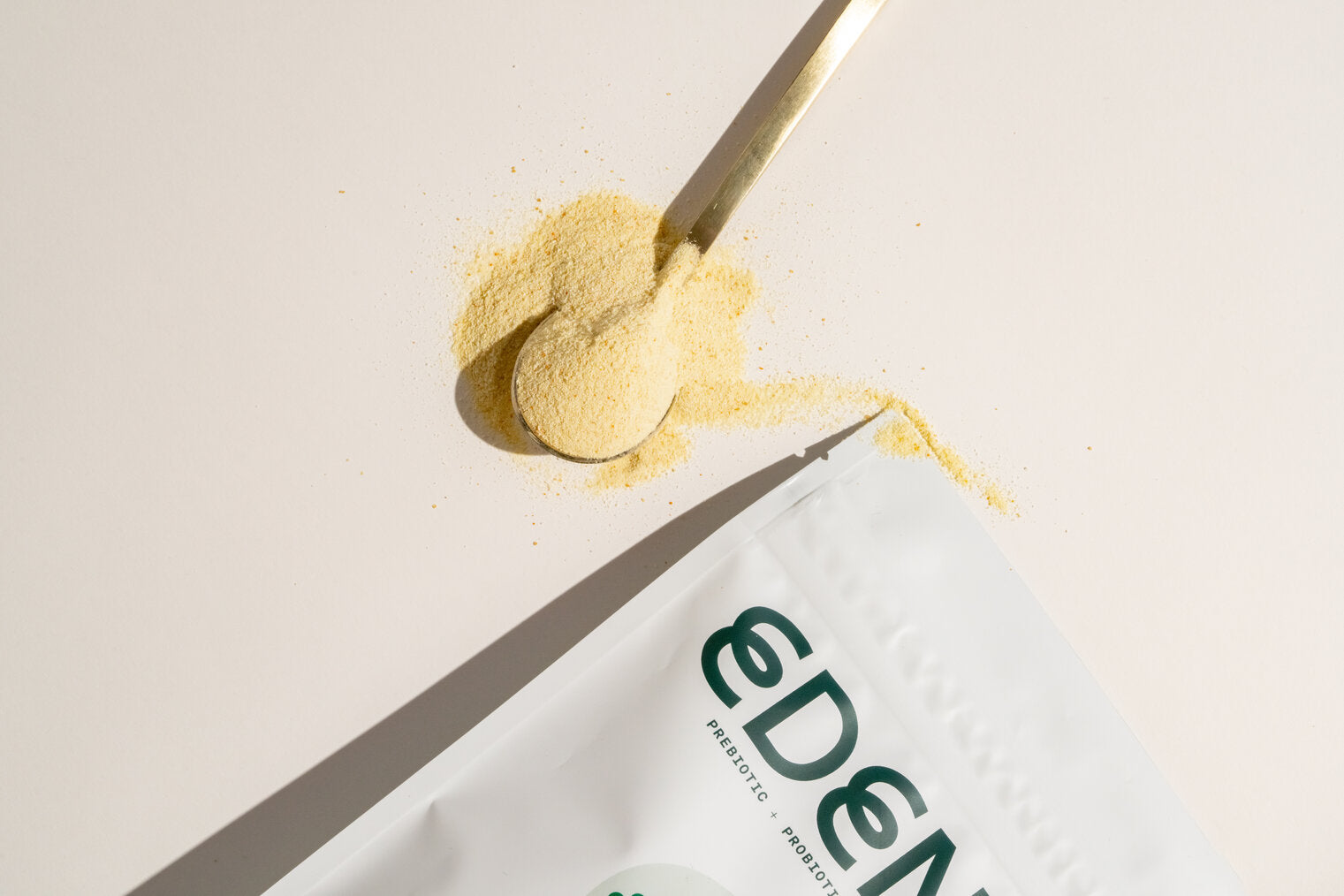At Eden's, we hand-selected the 14 most effective, all-natural ingredients for our daily synbiotic supplement, out of 28,000 potential possibilities. One of our five prebiotic fibers that made the cut was a resistant potato starch called Solnul™. You may be wondering what resistant starch is, and why we specifically chose to include it in our product.
Here's everything you need to know about resistant starch.
[[mailing_list]]
The past few decades have seen enormous growth in research regarding the microbes living in your gut. And for good reason. Your gut comprises a rich community of trillions of microbes that work together to break down the food you eat. As living organisms, your gut microbes need a healthy supply of nutrients to grow and impart health benefits to your body. These nutrients are called prebiotics.
Types of resistant starch
All prebiotics are classified as fibers, and some kinds of starches can also be included in that list. (This may be surprising, given that starches are typically associated with processed foods, soft drinks, and grains.) A subclass of starches, called resistant starches, which are found abundantly in certain kinds of grains and fruits, act as a valuable energy source for your gut microbes. Specifically, certain resistant starches have been shown to enhance the production of microbes that improve digestion, reduce the unpleasant symptoms of irritable bowel syndrome (IBS) and other gastrointestinal (GI) ailments, boost immune system functioning, and even reduce “bad” (LDL) cholesterol.
While a diet rich in plant-based whole foods that are high in resistant starch is still the best way to take advantage of this beneficial microbe-feeding substance, ensuring you’re consuming enough can sometimes be challenging. Supplementing your diet with Eden’s provides you with the aforementioned resistant potato starch called Solnul™, together with four other prebiotic fibers, five key polyphenols and four probiotics — a synbiotic blend formulated to give your good gut microbes everything they need to thrive.
[[product]]
What are the health benefits of resistant starch?
Starch is a carbohydrate, which means it is composed of glucose molecules linked together by chemical bonds. If the small intestine cannot digest these starches, they are labeled “resistant.” They must make their way to the large intestine to undergo digestion, where resident colon microbes use the resistant starch as an energy source — in turn providing a host of benefits for your gut’s health:.
- Excellent fiber source: Resistant starch is a non-viscous, soluble fiber source that provides a wide range of benefits:
- Your gut microbes use fiber as an energy source, and consumption of resistant starch both increases the production of “good” bacteria (such as Bifidobacterium) and in turn is associated with increased production of short chain fatty acids (SCFAs) — major end products of bacterial fermentation in the human colon that are known to have wide-ranging impacts on host physiology.
- Butyrate is one of the most notable of these SCFAs, conferring a wide range of benefits that protect your gut from inflammation and help maintain its integrity — and resistant potato starch (RPS) has been identified as having particularly strong ability to increase concentrations of fecal butyrate in subject groups. With Solnul specifically, a small but significant increase in butyrate levels were observed relative to placebo among elderly and middle-aged participants.
- More on inflammation protection: A 2020 systematic review and meta-analysis of randomized controlled trials of resistant starch concluded that its consumption can indeed improve certain circulating inflammatory biomarkers that are believed to be involved in the chronic, low grade inflammation observed in many diseases — such as cardiovascular disease, obesity, metabolic syndrome, non-alcoholic fatty liver and type 2 diabetes. However, the study authors cautioned that more research, with a large sample size and accurate design, is recommended.
- Glucose control: Integrating resistant starch into your diet has been shown to reduce fasting blood sugar levels, which lowers the risk of type 2 diabetes (T2D).
-
May aid in weight management: Eating resistant starch can increase feelings of fullness and lower the amount of fat stored in the body. (However, the aforementioned 2020 meta-analysis cautioned that the exact mechanisms of weight reduction by RS remains unclear, despite the fact that certain studies have reported increases in the serum concentration of leptin and other gut satiety hormones after the intake of RS.)
What foods contain resistant starch?
Plant-based foods such as green bananas, legumes, potatoes, cashews, and oats contain the highest levels of the most resistant of the starches.
Solnul™: A resistant starch with optimal features
Solnul™ is a resistant potato starch (RPS) that was carefully selected for the Eden’s synbiotic formulation. Solnul™ forms granules that remain intact after passing through the stomach and small intestine. Because Solnul™ maintains its structure as it enters the gut, this resistant starch provides abundant nutrients for your gut microbes to use.
The health benefits of Solnul™
A growing number of clinical trials point to the benefits of Solnul™ for your gut and body’s health:
- A healthier gut microbiome: Changes to the composition of your gut microbiome can be either health-enhancing or disease-provoking. When such changes drive metabolic and immune diseases, that process is considered dysbiotic. (For example, the growth of certain strains of the bacterial species, E. coli, can drive inflammation and disease.) Conversely, the consumption of certain substances can result in an increased abundance of “good” bacteria, such as Bifidobacterium — which is associated with a wide range of benefits such as improved gut function (including reduced symptoms of irritable bowel syndrome, or IBS) and immune homeostasis (not only throughout the GI tract, but in the whole body). In a 75-person clinical study (unpublished), Solnul™ resistant potato starch did just that: promoted the growth of Bifidobacterium. In two other clinical trials, formulations of Solnul™resistant potato starch were shown to promote substantial increases in total fecal short-chain fatty acid (SCFA) content.
- Reduced inflammation: Chronic low-grade inflammation is a key contributor to cardiometabolic, gut, and even cognitive disorders — including diabetes, chronic kidney disease, heart disease, stroke, IBS and irritable bowel disease (IBD), and Alzheimer’s. Eating fiber-rich foods, while improving gut functioning, can help alleviate such inflammation. The Eden’s formulation, containing Solnul™, increased the production of an important anti-inflammatory molecule, called IL-10, by 3.5-fold.
- Improved glucose control: Like other resistant starches, Solnul™ can aid in the management of blood sugar levels. In a 2018 prospective study using a formulation of Solnul™, healthy middle-aged adults who consumed it had lower blood glucose and elevated insulin levels. The ingestion of Solnul™ is also associated with reductions in Sporacetigenium, which in turn have been correlated with improved blood glucose and insulin metrics, according to a separate 2018 study.
- Improved cardiometabolic health: A subset of middle-aged and elderly volunteers who took Solnul™ saw reduced low-density lipoprotein (LDL) cholesterol levels, according to a 2020 study, mirroring Eden’s findings.
Solnul™ and improved medical outcomes
As seen through the body of research to date, many of the benefits that Solnul™ and other resistant starches provide are correlated with beneficial changes to the gut microbiome. While identifying these changes has solidified claims that certain bacteria are indeed beneficial for gut health, caution must still be taken when extending those claims to medical outcomes. Many factors contribute to a person’s gut microbiota, including their physical health (gut and otherwise), mental health, existing diet, and cohabitation — and many such factors are highly individualized.
In other words, everyone’s microbiota are different, and they respond differently to different dietary substances. So, while changes in gut microbiome composition can impact your health, the correlations need further vigorous testing to confirm the mechanisms behind a microbe’s benefits, and research in this realm is still evolving.
Key takeaways
Resistant starch is one of many prebiotic sources known to boost your gut health. While certain whole fruits and vegetables contain it, and other plant-based foods contain different prebiotic fibers and nutrients which provide some of the same health benefits, ensuring that your diet contains a healthy supply of resistant starch — with its unique benefits — can be challenging. Enter Eden’s, a synbiotic supplement that contains — along with 13 other ingredients — a quality, vetted resistant starch, Solnul™, which can benefit your gut microbiome by driving mechanisms that result in increased Bifidobacterium and overall SCFA content, resultant improved nutrient uptake, an overall healthier digestive and immune system, cardiovascular benefits (such as lower LDL cholesterol levels), and better blood glucose control.

